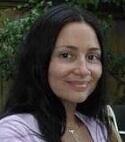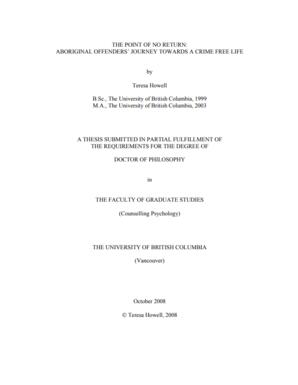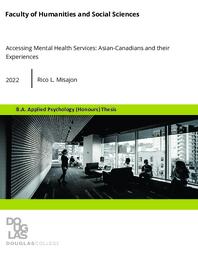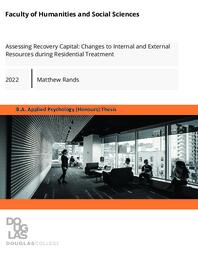Howell, Teresa M.
Person Preferred Name
Teresa Howell
Position
Faculty member
Field of Activity
Indigenous offenders and the Criminal Justice System
Traditional Indigenous healthcare practices
Cultural competency
Cultural safety
Mental health
Addictions
Phone
(604) 777-6274
Website
Email/Contact
howellt1@douglascollege.ca
Department
Status
current
Education and Credentials
Ph.D., Counselling Psychology, University of British Columbia
M.A., Psychology (Specialization: Forensic Psychology), University of British Columbia
B.Sc., Psychology (Specialization: Biopsychology), University of British Columbia
R.Psych (College of Psychologists of BC)
Professional Affiliations and Community Service
2011- present, Member, College of Psychologists of BC (#1955)
2011-present, Member, British Columbia Psychological Association
2010-current, Pro-bono Psychological Services, PHS Community Services Society
Academic and Professional Profile
My research interests include: Traditional Indigenous healthcare practices, cultural competency and cultural safety, mental health and addictions, and Indigenous offenders and the Criminal Justice System. The most recent large research project that I completed was an Indigenous Health research project, funded by the Vancouver Foundation. The project was titled: Sharing our Wisdom: a Holistic Aboriginal Health Initiative. Goals and outcomes of this research project included: creating an impact on social and health policy in reference to Indigenous health care strategies, promoting Indigenous knowledge and practices, and providing a voice for the community through research. I have also been awarded prestigious research grants from both the Social Sciences and Humanities Research Council of Canada and the Canadian Institute of Health Research. I have experience in both quantitative and qualitative research methodologies. For future research, I would like to continue my work with Indigenous health and wellness. Specifically, I would like to collect more data on Indigenous participant’s experiences of traditional health care practices and the impact traditional health care practices have on mental, emotional, spiritual and physical health. I am a mother, wife, daughter, sister, friend, therapist, teacher, and researcher. I am honoured to work on the traditional territories of the Coast Salish peoples on the west coast of British Columbia. It is on this land that I am able to be a faculty member at Douglas College, as well as, a registered psychologist with an active therapy practice. I am driven by the facets of Indigenous epistemologies, community psychology, and social work, which allow me to understand and engage with people/communities from a broader systemic and socio-political perspective. I describe myself as a social justice educator and I have been working in the field of mental health and addictions for over 15 years. In my clinical practice, I have experience working with: trauma, mental health/illness/wellness, abuse, grief and loss, stress, residential school issues, the impact of colonization, relationship challenges, domestic violence, substance misuse and addictions. My work as a therapist informs and enhances my teaching practice. I would describe myself as a social justice educator and I try to teach from an experiential perspective and I encourage students to be engaged and embrace the process of not only learning about the material/theory, but to learn about themselves as well.
Ph.D., Counselling Psychology, University of British Columbia
M.A., Psychology (Specialization: Forensic Psychology), University of British Columbia
B.Sc., Psychology (Specialization: Biopsychology), University of British Columbia
R.Psych (College of Psychologists of BC)
Professional Affiliations and Community Service
2011- present, Member, College of Psychologists of BC (#1955)
2011-present, Member, British Columbia Psychological Association
2010-current, Pro-bono Psychological Services, PHS Community Services Society
Academic and Professional Profile
My research interests include: Traditional Indigenous healthcare practices, cultural competency and cultural safety, mental health and addictions, and Indigenous offenders and the Criminal Justice System. The most recent large research project that I completed was an Indigenous Health research project, funded by the Vancouver Foundation. The project was titled: Sharing our Wisdom: a Holistic Aboriginal Health Initiative. Goals and outcomes of this research project included: creating an impact on social and health policy in reference to Indigenous health care strategies, promoting Indigenous knowledge and practices, and providing a voice for the community through research. I have also been awarded prestigious research grants from both the Social Sciences and Humanities Research Council of Canada and the Canadian Institute of Health Research. I have experience in both quantitative and qualitative research methodologies. For future research, I would like to continue my work with Indigenous health and wellness. Specifically, I would like to collect more data on Indigenous participant’s experiences of traditional health care practices and the impact traditional health care practices have on mental, emotional, spiritual and physical health. I am a mother, wife, daughter, sister, friend, therapist, teacher, and researcher. I am honoured to work on the traditional territories of the Coast Salish peoples on the west coast of British Columbia. It is on this land that I am able to be a faculty member at Douglas College, as well as, a registered psychologist with an active therapy practice. I am driven by the facets of Indigenous epistemologies, community psychology, and social work, which allow me to understand and engage with people/communities from a broader systemic and socio-political perspective. I describe myself as a social justice educator and I have been working in the field of mental health and addictions for over 15 years. In my clinical practice, I have experience working with: trauma, mental health/illness/wellness, abuse, grief and loss, stress, residential school issues, the impact of colonization, relationship challenges, domestic violence, substance misuse and addictions. My work as a therapist informs and enhances my teaching practice. I would describe myself as a social justice educator and I try to teach from an experiential perspective and I encourage students to be engaged and embrace the process of not only learning about the material/theory, but to learn about themselves as well.







